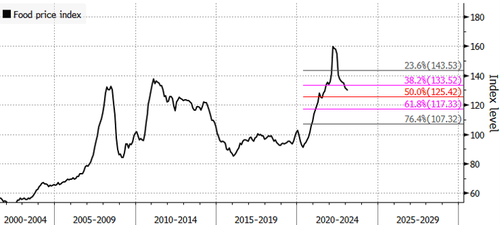Global Food Prices Slide For Eleventh Month And Could Soon Show Up In Supermarket Savings
Inflation re-accelerated in the US and Europe last month, highlighting sticky price pressures that keep central banks ultra-hawkish and committed to increasing the terminal rate. Interest rate markets are still repricing the 'about face' in the disinflation narrative, which has caused cross-asset turmoil. Despite the lingering inflation storm, there is good news: global food prices in February declined for the eleventh consecutive month.
The United Nations' Food and Agriculture Organization's Food Price Index fell .6% last month to 129.8. Last month's decline was driven by the price of slumping cooking oils and dairy products, while grain and meat prices were flat, and sugar prices climbed.
According to the data, the food supply crisis triggered by the Covid pandemic and the conflict in Ukraine is showing signs of improvement. The FAO's index reached an all-time high following the Russian invasion of Ukraine, but prices have since dropped by 18% from their peak. Nevertheless, prices are still 42% higher than their levels during the onset of the Covid outbreak.
(Click on image to enlarge)
Although global food prices peaked one year ago, consumers have complained supermarket prices are still high. This is because it takes time to filter through, while supermarkets deal with elevated transportation, energy, and labor costs.
However, there is more promising news. The largest US meat company, Tyson Foods, missed Wall Street estimates for quarterly profit last month for operating margins this year in the face of falling - yes, falling - beef prices, easing demand for pork, and an ongoing crash in chicken prices as a result of overproduction.
Fast food restaurant chain Wendy's Co. reported commodity inflation in the mid-single digits this year and beef prices to be deflationary in its current fiscal year. And Kraft Heinz Co. said there would be no more price hikes in North America, Europe, Latin America, and Asia.
Unless there is another global supply chain disruption or worsening of the war in Ukraine, food prices might not have just peaked, but declines could soon show up in supermarkets.
More By This Author:
Twitter Challenges Persist As December Revenues, Adjusted Earnings Dropped 40%Tesla China Sales For February Rise 13% To 74,402 Units
Surge In Mortgage Rates Above 7% Sends Homebuyer Applications To 28 Year Low
Disclosure: Copyright ©2009-2023 ZeroHedge.com/ABC Media, LTD; All Rights Reserved. Zero Hedge is intended for Mature Audiences. Familiarize yourself with our legal and use policies ...
more



